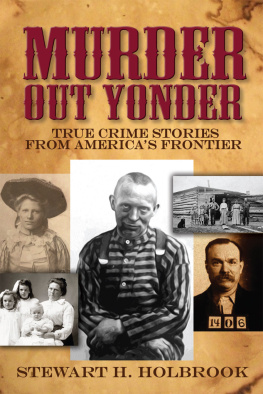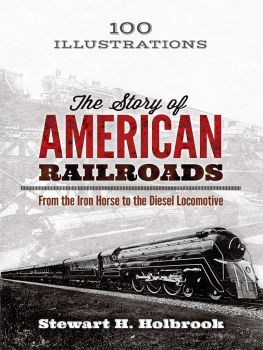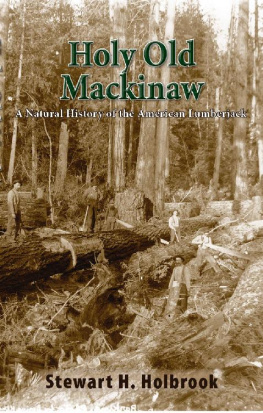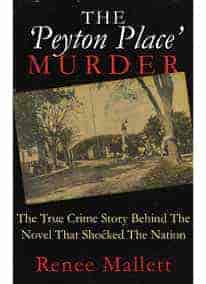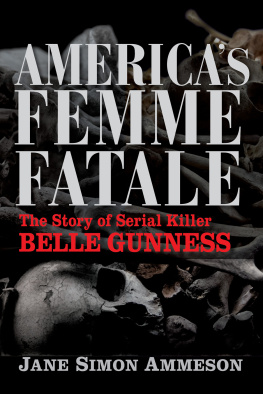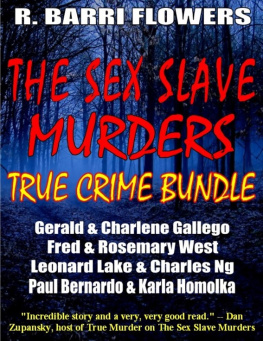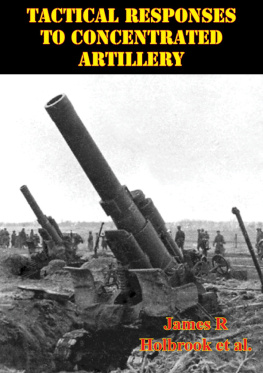MURDER OUT YONDER
TRUE CRIME STORIES FROM AMERICAS FRONTIER
STEWART H. HOLBROOK
DOVER PUBLICATIONS, INC.
MINEOLA, NEW YORK
Bibliographical Note
This Dover edition, first published in 2016, is an unabridged republication of the work originally published by The Macmillan Company, New York, in 1941 under the title and subtitle Murder Out Yonder: An Informal Study of Certain Classic Crimes in Back-Country America.
Library of Congress Cataloging-in-Publication Data
Names: Holbrook, Stewart H., 18931964, author.
Title: Murder out yonder : true crime stories from Americas frontier / Stewart H. Holbrook.
Description: Mineola, New York : Dover Publications, 2016. | This Dover edition, first published in 2016, is an unabridged republication of the work originally published by The Macmillan Company, New York, in 1941 under the title and subtitle Murder Out Yonder: An Informal Study of Certain Classic Crimes in Back-Country America. | Includes index. Includes bibliographical references and index.
Identifiers: LCCN 2015041057
eISBN-13: 978-0-486-81185-7
Subjects: LCSH: MurderUnited StatesCase studies. | Rural crimesUnited StatesCase studies.
Classification: LCC HV6524 .H8 2016
DDC 364.152/30973091734dc23 LC record available at
http://lccn.loc.gov/2015041057
Manufactured in the United States by RR Donnelley
80387201 2016
www.doverpublications.com
FOR KATHIE
CONTENTS
MURDER OUT YONDER
CHAPTER ONE
DEATH AND TIMES OF A PROPHET
ON WHAT DATE a shaft of divine light transformed Franz Edmund Creffield from an obscure rural evangelist into Prophet Joshua the Second in all his glory is not known. Neither is the exact spot where the visitation took place. But the time is certain. It was 1903, and the neighborhood of the miracle was Corvallis, Oregon.
Troubles follow in the wake of a prophet as naturally as water runs downhill. If the prophet has a set of Old Testament whiskers and a chronic case of satyriasis, then the troubles are sure to be multiplied and likewise interesting.
This particular backwoods Joshua had both the whiskers and the affliction. And when he raised his voice in holy anger, as he did on one remembered occasion, the vast city of San Francisco shook horribly in the grip of an Act of God, then went down, writhing and smoking, in one of the greatest disasters within the memory of living men.
Driving up the lush green Willamette Valley from Portland to Corvallis, one scarcely wonders that this land once produced a veritable prophet. It is amazing there have not been more of them. Here was the Promised Land where the creaking covered wagons came to rest at the far end of the Oregon Trail; where the immigrants shouted Glory to God! and drove their stakes, naming their settlements Amity, Sweet Home, Salem, Aurora, and Corvalliswhich last is said to mean heart of the valley. Here along the many creeks is beaver-dam soil, richer than the delta of the Nile. Vegetables grow as large as the pictures on the seed packages. Enormous prunes and the finest walnuts on earth hang heavy on the trees. Vetch and clover grow thick and big enough to stop the wheels of powered farm machinery. The climate is damp and mild. Seldom is there more than a trace of snow.
Here and there along the ninety miles the highway plunges into groves of Douglas fir, tall and mighty before Lewis and Clark and the Hudsons Bay Company came. To the east rises the backbone of Oregon, the majestic peaks of the Cascades and on the west are the Coast Range mountains, faintly hung with mist and with haze in seasonbrooding, black, faraway hills to make a prophet out of almost any man.
In the heart of this valley is Corvallis, seat of Oregon State College, a spick-and-span town in 1941 that holds court for Benton County; sells things to farmers; makes considerable lumber; has a daily paper, a radio station, and a library of 130,000 volumes including a 15th century antiphony composed of Gregorian chants in Flemish, hand-printed and illuminated on parchment, and bound in calf over the original board covers.
Corvallis is sedate enough today, as serene as any campus town in the land. It has, in fact, been sedate throughout most of its three-quarters of a century. Only during the days of Joshua the Second, when signs and portents were on every hand, did Corvallian blood run hot and fast.
2
Unheralded, Franz Edmund Creffield made his first appearance in the Corvallis of 1902 in the form and style of a Salvation Army worker. He was thirty-five years old, smooth-shaven, short of stature, and had large brown eyes. He retained a slight but noticeable accent from his native Germany.
A few months later, or early in 1903, he either left or was discharged from the religious group, and seems to have disappeared for a time. It was likely during this obscure period that the great light beat upon him and he talked with God somewhere in the tall forests that edged close to the town. In any case, he was soon back in Corvallis.
In 1903 no man could be a true prophet who did not have a beard, and when Creffield emerged from the timber he was wearing an astonishing growth. It was of the veritable Moses type, flowing down over his chest and spreading to left and right, unruly, wild, burgeoning like everything in the Willamette Valley, while over his shoulders tumbled falls of unkempt hair. Both beard and hair were of a reddish, golden brown.
He was Edmund Creffield no longer, but Joshua the Secondsole prophet and for a short period sole communicant of the Church of the Bride of Christ. Even the tone of his voice had changed. It no longer had the supplication, the winning humbleness, of street and field evangels. It now boomed like muffled thunder and in it, many came to think, was the authority of Jehovah.
It must have been that the Corvallis of the time, in spite of its several churches, was lacking somewhat in spiritual life, at least so far as the women were concerned. In those days, of course, there were no movies, no serial radio dramas, no bridge clubs to entertain and thus protect the dim minds of vapid females; so it is conceivable that time in Corvallis, as in any other American town, often seemed interminable to those who live chiefly to kill time.
And it is conceivable, too, in view of the record, that this brand-new Joshua possessed a magnetic if not a downright hypnotic personality. Within a month he had a sizable cult of converts. It was all done so quietly that even the town fathers, who fancied they knew almost everything that went on locally, were wholly unaware of the great harvest of souls that was going forward.
The first meetings were held openly in the homes of converts, of whom at least six were men. At this period the prophet seems to have had no particular message other than that the ways of the world were all wrong and should be changed. One by one the male converts dropped away, leaving Joshua and a stooge known as Brother Brooks to carry on with the increasing flock of girls and women.
If you think that the apostasy of the few men was discouraging to the prophet, then you dont know how an Oregon Joshua works when he gets going Full Gospel style. The meetings in the homes of converts were continued; but they now were held in the afternoons, when menfolk were away.
There must have been a female Judas in the flock, for it was presently whispered around town that never before had there been seen such manifest workings of the Spirit as Joshua Creffield brought about. Pulling down all the blinds of the meeting placeso this she-Judas reportedJoshua began a chant, swaying to its rhythm, waving his arms, and calling upon what he addressed rather familiarly as the Full Spirit to descend upon the meeting.

